Now that spring is finally here, the next season on everyone’s minds is summer: warm temperatures, lazy afternoons at the beach and plenty of cookouts with family and friends. There’s so much to love about summer, it can be easy to forget one of the things we don’t always enjoy about the season — slowly succumbing to the heat in your own home.
Luckily, we have a way to beat the heat that accumulates in our homes. Air conditioning is a fantastic tool that helps many of us get through sweltering summer days that might otherwise be unbearable.
Consistent air conditioning maintenance throughout an AC units lifetime will definitely help to elongate the time that it will last. However, air conditioning is not infallible. These units can break, wear down and malfunction just like any other tool. It doesn’t have to be the end of the world when this happens, however. With a little practice and research, you can learn more about your air conditioning units. You can learn when to take action to repair a faulty unit, or when it needs a professional to come and service it. Perhaps most importantly of all, you can learn when your air conditioner is past helping and just needs expert replacement.
Today, we’ve put together this guide to walk you through the process of buying a new air conditioner. We’ll talk about how to recognize when your unit needs replacing, what to look for in a new unit and so much more. By reading this guide, we hope you’ll be more confident in knowing how to choose an AC unit & be equipped to make it through the South Carolina summer heat.
How Often Should You Upgrade Your AC Unit?
There are several answers to this question, and none of them are cut and dry. There are so many models of air conditioning units available today, and every home has different comfort needs. Lifespans vary widely among these different units, so there is no universal rule that dictates how often they should be replaced.
Even among people who have the same AC unit model, there are likely to be variations. One unit may have a slight defect, while the other is perfect. Different units in different homes will also be subject to various environmental factors, which will affect their lifespans as well. Some will have to work harder than others, and some might get damaged due to improper handling or installation. In this way, we can see there may be different lifespans, even in two units that are the same model.
In an ideal world, most air conditioning units need replacement about every 10 years. This estimate is extremely rough, however, and you should take it with a grain of salt. Some units will need replacement long before hitting this milestone, and others will still run smoothly long after this date has passed.
The only completely accurate way to know when your air conditioner needs replacement is to play it by ear. Notice when your unit starts to fail or malfunction. If 10 years have passed without replacing your unit, it might be wise to have a professional take a look. At this time, they may recommend replacing it, or they may clear your unit to keep running. Either way, it’s best to be sure, especially if your unit has been running for that many years.
5 Signs It’s Time for a New Air Conditioning Unit
Just now, we said the best way to know when to replace your air conditioner was to play it by ear, watching and listening for signs of trouble on a case-by-case basis. This advice is all well and good, but it can be difficult to follow if you have no idea what you’re looking for. If you’ve never had any experience with air conditioning units, it may be hard to recognize signs of trouble, short of the entire thing ceasing to operate.
With this in mind, let’s take a look at some of the telltale signs that might be your air conditioning unit’s way of telling you something has gone wrong.
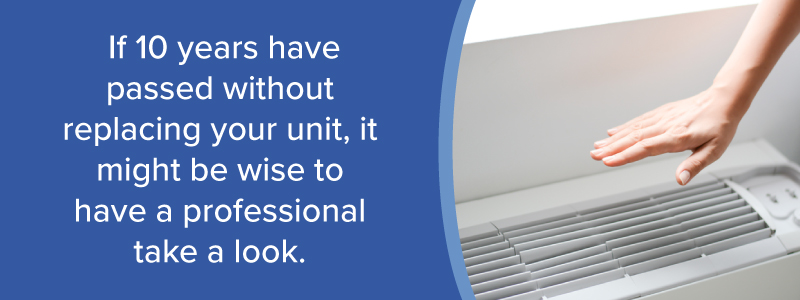
1. Your Air Conditioner Is Over 10 Years Old
We already talked about this, but it’s worth including in this list as well. While not every machine that’s older than 10 years old will need replacing, the odds are decent your unit could stand to be replaced after this many years. These units are not designed to last forever, and many of them will break down before they even reach the 10-year mark. If yours has survived that long, there is a good chance something is going wrong — it might just not be something you can see.
Call a service professional for air conditioning maintenance and inspection. They might tell you everything looks fine, or they might recommend a replacement. No matter what they say, it’s always best to be sure.
2. Your Air Conditioner Is Inefficient
Today, all new AC units on the market are required to have a SEER rating of at least 13. This rating system determines how efficient your unit is. If your unit is older, it may have a rating of lower than 13, as it wouldn’t have been subject to these newer regulations. Because of this potentially lower SEER rating, your older AC unit could be costing you a lot of money to keep it running.
While inefficiencies aren’t necessarily the same as a malfunction of your older unit, they are a very good reason to upgrade to a newer unit. While you’ll pay the cost of a new unit, it will end up saving you money in the long run, as your energy bills drop thanks to the efficiency of the new unit.
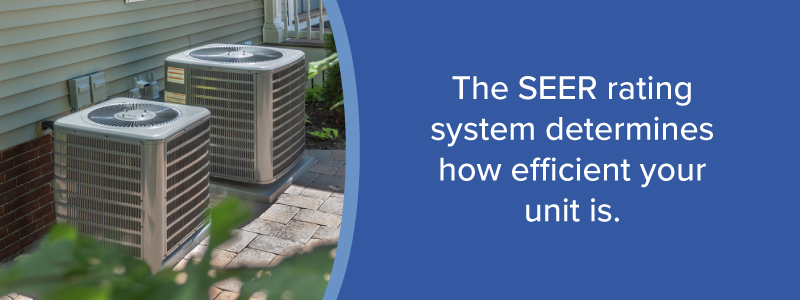
3. You’re up Against an Expensive Repair
This principle is the same with cars, water heaters, dishwashers and any other type of machine or appliance you can imagine. If you have a machine that has lived a long and useful life and it suddenly breaks or malfunctions, you’ll need to have a service professional look at it and give you a diagnosis, as well as the estimated cost of fixing it. You’ll then need to decide if the expense of the repairs is worth it.
In some cases, the repairs might be worthwhile. If the unit is old, however, you should realize even if you repair it, it will likely break down again before too long. It might make more sense to put your money toward buying a new unit altogether.
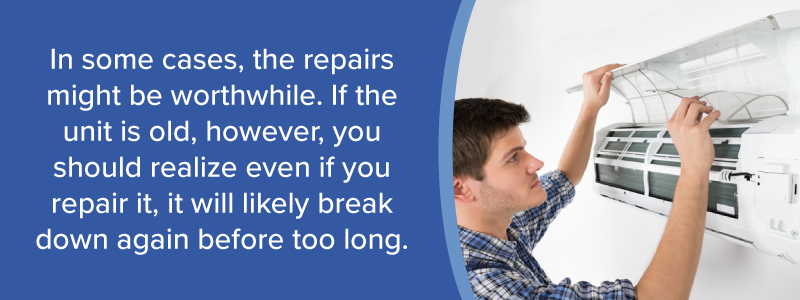
4. Your Unit Keeps Breaking Down
Has your AC unit broken multiple times in the past year or years? Do you find yourself constantly calling the heating and cooling service professionals? If so, it might not be worth paying for yet another repair when you know it’ll only break down again in a few months. Instead, it would be better just to give in and buy a new unit.
5. Your Home Isn’t a Comfortable Temperature
If your air conditioner isn’t capable of keeping your home at a temperature you like, it clearly isn’t working well. It could be that something is malfunctioning and needs repairs. It’s also just as likely your unit is old, breaking down and needs replacing. By purchasing a new unit, you’re ensuring you and the rest of your family members will be comfortable for the rest of the summer and for years to come.
What to Look for When Buying a New Air Conditioning Unit
Once you’ve decided to get rid of your old unit and upgrade to a new one, you’ll immediately be facing with a whole new set of questions. What should you look for in new air conditioners for sale? What are features to be aware of? How do you choose the best air conditioner for your home?
Here is our list of important things to keep in mind as you’re choosing an AC unit for your home.
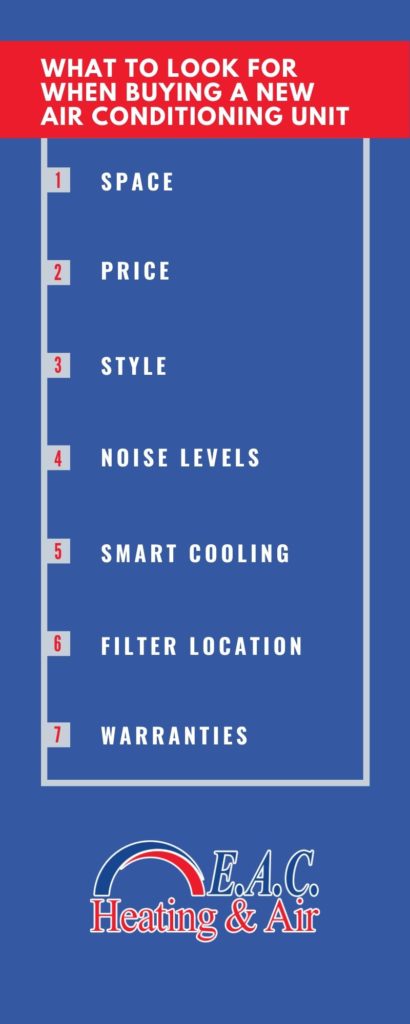 1. Space
1. Space
When shopping for a new AC unit, one of the first things you’ll need to think about is how large of a space you’re looking to cool. Will this unit work for the whole house, or is it only intended to cool one room? Your answer to this question will help you determine what size unit you’re looking for.
2. Price
It’s a good idea to settle on a budget before you begin shopping. It might be wise to do a little bit of browsing, to discover what typical prices are, but after that, it’s best to come up with an amount you absolutely do not want to go over. Budgeting will help you narrow down your choices quite a bit, as you’ll be able to eliminate any options that are outside your price range, as well as any that cost far below what you’re willing to spend.
3. Style
There are many different types of air conditioning units on the market today, and you’ll be able to narrow down your choices considerably by deciding which style is right for you and which ones you’re not interested in.
Some of the most common styles of AC units today are:
- Window units — These types of units fit right into the window, and come in a variety of sizes that are appropriate for rooms of different sizes. They’re convenient because they don’t take up any floor space. The drawback, however, is that your window becomes much less accessible.
- Portable units — As their name suggests, you’ll be able to move these units to cool whatever room you choose. They make a great alternative to window units, if your home’s window configuration doesn’t allow for them. One of their drawbacks, however, is that they can be large and difficult to move, as well as being noisier than typical window units.
- Split ductless units — Split units are a good way to cool down multiple rooms without having to rely on central air or purchase and maintain multiple units. They are more expensive than either portable or window units, but that’s because they cool multiple rooms. They make a solid alternative if installing central air isn’t an option.
4. Noise Levels
Are you a light sleeper? Do you only sleep well in absolute silence? You’ll want to pay extra attention to your potential new unit’s noise levels. Even if you’re not worried about your sleeping habits, be aware some units produce such loud noise, they might be disruptive even during the day.
5. Smart Cooling
Some of the newest and most high-tech models on the market today are connected to the Internet. With these units, you can adjust the settings or raise and lower the temperature right from your computer or smartphone. While this isn’t always a necessary feature, it offers an undeniably impressive level of convenience. Especially if your unit is in a place that’s difficult to reach, it can be extremely useful to have access to the controls right in the palm of your hand.
6. Filter Location
Air filters are essential to maintaining good indoor air quality, so you’ll have to change the filter on your AC unit regularly. Pay attention to where the filter is located in your home, and think about where you’ll be installing the unit. You’ll want to choose a unit that will allow you to easily access the filter, based on where you plan to install it.
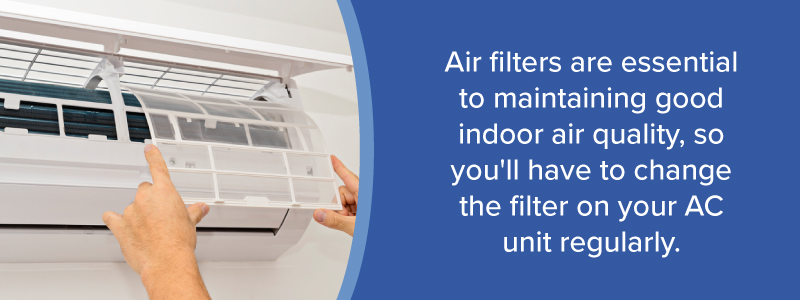
7. Warranties
Some air conditioning units have longer warranties than others. While this is a personal preference, it’s certainly to your advantage to purchase a unit with the longest warranty possible. If this information isn’t immediately available, do some searching online to see what you can find, or ask the manufacturer. Either way, this is something to be aware of and look out for as you shop.
Finding a Service Partner to Keep Your AC Unit in Top Shape
While sometimes replacing your AC unit is the only solution, there are usually plenty of steps you can take before it comes to that. Before you resort to buying an entirely new unit, contact your local service professionals for help getting your air conditioner back in top condition.
Don’t have a service professional yet? If you’re looking for an air conditioning company on Hilton Head, we’d like to help. Here at EAC Heating and Air, we hope you’ll consider us for all your heating and cooling needs, including servicing your AC unit or buying air conditioning in Hilton Head. As an HVAC company, we want to help you eliminate humidity and heat in your home this summer by working as your air conditioning service professionals. Whether you live on Hilton Head Island or nearby, we can provide assistance with air conditioning repair, maintenance, and many other similar needs.
Now that summer is nearly here, there’s no better time to get started than the present. Get your air conditioner serviced before the heat of the season kicks in. To get started, fill out our contact form today, or give us a call at 843-681-3999.
